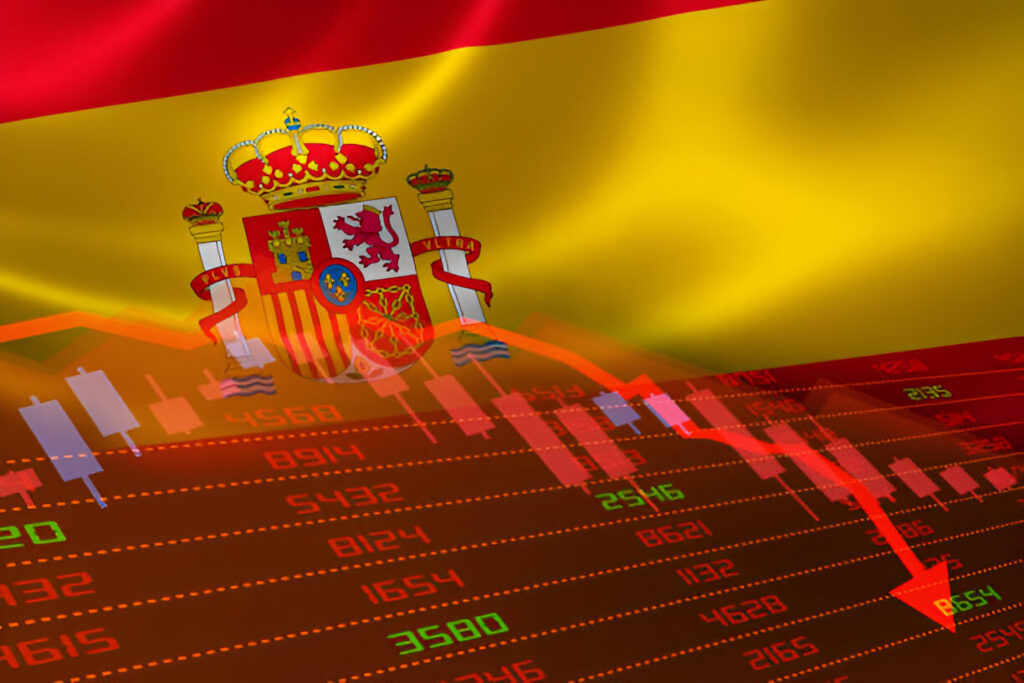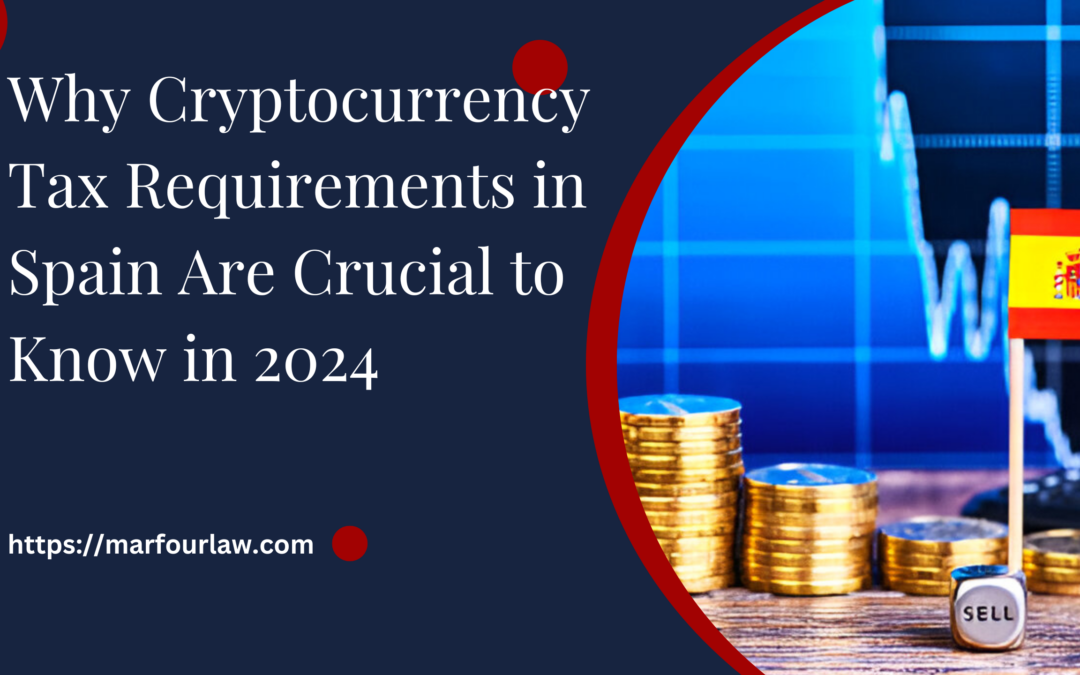Cryptocurrency tax requirements in Spain are essential for every crypto investor. Spain’s tax regulations on cryptocurrency have changed significantly, leaving many unsure how to comply. This blog will break down the essentials if you’re holding bitcoins in Spain or dealing with other digital currencies. We’ll go over everything from tax brackets to capital gains in simple terms.
Cryptocurrency is more than just digital money; it’s a financial revolution. But with great power comes great responsibility, especially regarding taxes. Let’s break down why cryptocurrency tax requirements in Spain matter.



Why Cryptocurrency Tax Requirements in Spain Matter?
Cryptocurrency is more than just digital money; it’s a financial revolution. But with great power comes great responsibility, especially when it comes to taxes. Let’s break down why understanding cryptocurrency tax requirements in Spain is crucial.Spain’s Tax Authority is Serious About Crypto
Spain’s tax authority, the Agencia Tributaria, isn’t messing around regarding cryptocurrency. They view crypto just like any other asset, which means it’s subject to tax rules. Whether you’re trading Bitcoin, Ethereum, or any other cryptocurrency, the government wants its cut. Ignoring these rules can lead to hefty fines or even legal trouble. It’s similar to forgetting to pay taxes on income—you can’t just brush it under the rug and hope for the best.Ensuring Compliance Helps You Avoid Trouble
One of the main reasons for paying attention to cryptocurrency tax requirements in Spain is to avoid unnecessary headaches. The rules might seem complicated at first, but getting them right can save you a lot of trouble down the road. Imagine driving down a road filled with speed cameras—if you know where they are, you’ll likely avoid a ticket. In the same way, understanding tax obligations helps you steer clear of penalties.Reporting Gains and Losses is Essential
In Spain, if you make money from selling or trading cryptocurrency, it’s considered a capital gain and must be reported on your tax return. On the flip side, if you lose money, those losses can be deducted to reduce your tax bill. It’s like a seesaw—both sides need to be balanced. Not reporting these transactions could lead to an audit, and let’s be honest, no one wants that kind of attention.Planning Your Crypto Investments Wisely
Knowing the tax implications before diving into cryptocurrency can help you make smarter decisions. For instance, holding onto your crypto for more than a year could result in lower tax rates on your gains. It’s similar to planting a tree—the longer you let it grow, the more shade it provides. By planning your investments with tax rules in mind, you can maximize your returns while minimizing your tax liability.Staying Informed About Changing Regulations
The world of cryptocurrency is constantly evolving, and so are the regulations surrounding it. What’s true today might not be true tomorrow, so it’s essential to stay updated. Think of it like sailing on a changing tide—keeping an eye on the horizon ensures you don’t get caught off guard. Keeping track of new developments in Spanish tax law can help you stay compliant and avoid surprises. In summary, you can’t afford to ignore cryptocurrency tax requirements in Spain. By taking them seriously, staying informed, and planning, you can enjoy the benefits of cryptocurrency without the stress of legal or financial troubles.10 Steps to Know About Cryptocurrency Tax Requirements in Spain
The steps to meet cryptocurrency tax requirements in Spain involve accurately tracking all transactions, calculating gains or losses, and reporting them correctly on your annual tax return. Staying compliant helps you avoid penalties and ensures you’re in good standing with Spanish tax authorities.
Identify Your Cryptocurrency Holdings
First, you need to make a detailed list of all your cryptocurrencies. This means listing each type, like Bitcoin, Ethereum, or any other digital currency, and noting the amount of each. Think of this as creating a personal inventory of your digital assets. This step is crucial because having a clear record of what you own will help you accurately track gains and losses and prepare for tax reporting.Track Every Transaction
Keep a detailed log of all your cryptocurrency transactions. Each time you buy, sell, trade, or transfer any cryptocurrency, jot down the date, the amount involved, the value in euros at that time, and the nature of the transaction. This is like keeping a financial diary for your crypto activities. Proper tracking ensures you have all the necessary information to calculate gains and losses accurately when tax season rolls around.Calculate Your Gains and Losses
Next, you need to figure out your financial outcome from cryptocurrency transactions. To do this, compare the value of your cryptocurrency when you bought it to the value when you sold or traded it. For example, if you purchased Bitcoin at €10,000 and sold it later for €15,000, you’ve made a €5,000 gain. This calculation is crucial for determining your tax liability, as the difference between the purchase price and the sale price is what you report.Understand the Tax Brackets
Get familiar with Spain’s tax brackets for capital gains. For the year 2024, the rates are set at 19% for gains up to €6,000, 21% for gains between €6,000 and €50,000, 23% for gains from €50,000 to €200,000, and 27% for gains exceeding €200,000. Knowing these rates helps you estimate how much tax you’ll owe based on your total gains. It’s like knowing the different tiers in a game that affect your score and strategy.Offset Gains with Losses
You can use losses from some cryptocurrency transactions to reduce your taxable gains. If you’ve earned €10,000 from one investment but lost €2,000 on another, you can subtract the loss from your gain. This approach helps lower your overall taxable income, which can reduce the amount of tax you owe. It’s similar to using a discount to lower the final cost of a purchase.Report Your Holdings and Transactions
When filing your taxes, include a complete report of all your cryptocurrency holdings and transactions. Report both your gains and losses accurately to comply with tax regulations. This step ensures you’re transparent with your tax authorities and avoids potential issues. Think of it as submitting a comprehensive report card for your financial activities.Plan for Future Taxes
Consider how your future cryptocurrency transactions might affect your taxes. If you’re planning to make significant trades or sales, the timing of these transactions can influence your tax bracket. By planning, you can manage your tax obligations more effectively. It’s like strategizing for a big game to maximize your performance and minimize penalties.Stay Updated on Tax Laws
Tax regulations, especially those concerning cryptocurrencies, can change frequently. Stay informed about any updates or new rules that may affect how you handle your digital assets. Keeping up with these changes ensures you remain compliant with the current laws and avoid surprises. It’s like keeping an eye on the latest news to stay informed and prepared.Consider Professional Help
If handling cryptocurrency taxes feels overwhelming, think about consulting a tax professional. They can provide expert advice and help you navigate the complexities of tax regulations. A professional can simplify the process and ensure you meet all legal requirements, much like having a coach to guide you through a challenging game.Review Your Tax Strategy Regularly
Periodically review your tax strategy to ensure it’s still practical and up-to-date. This means checking if your record-keeping methods are working well, your calculations are accurate, and your planning aligns with the latest tax laws. Regular reviews help you stay on top of your tax situation and make necessary adjustments. It’s like conducting regular check-ups to ensure everything is running smoothly.How Do These Tax Rules Impact Your Crypto Assets?
Cryptocurrency might seem like a new frontier, but just like any investment, it comes with its rules and regulations. In Spain, these tax rules can significantly impact your crypto assets, and it’s essential to know how they affect you. Let’s break it down in a way that makes sense.Taxing Your Profits and Losses
When you make money from your crypto investments, the Spanish tax authority treats it as a capital gain. This means that whether you’re selling Bitcoin after a price surge or trading one cryptocurrency for another, any profit you make is subject to taxes. Conversely, if the market dips and you sell at a loss, those losses can help reduce your tax bill. Think of it like a balance sheet—profits add to your taxable income, while losses can offset it.Impact of Holding vs. Trading
How long you hold onto your crypto assets can also change how they’re taxed. In Spain, having your assets for over a year could lead to a lower tax rate on your gains, much like how long-term investments in traditional stocks work. It’s similar to letting a good wine age—the longer you wait, the more value it might gain. However, frequent trading could bump you into higher tax brackets, so considering your strategy before making moves is worth considering.Reporting Requirements and Penalties
Spain takes its tax reporting seriously, which extends to your crypto assets. Every time you make a taxable transaction, whether a sale, trade or even a crypto purchase, you must report it on your tax return. Failure to do so could result in hefty fines or penalties. Imagine forgetting to declare items at customs—you might go unnoticed, but the consequences can be steep if caught. Staying on top of your reporting is crucial to avoid unnecessary trouble.Potential for Audits
When dealing with crypto, the risk of an audit can feel like a shadow lurking over your shoulder. The Spanish tax authority is increasingly focused on cryptocurrency transactions, and discrepancies in your reporting could trigger an audit. Picture it as having a watchdog overseeing your transactions—if something doesn’t add up, they’ll start digging deeper. Ensuring your records are accurate and complete is the best way to keep that watchdog at bay.Planning for the Future
Lastly, these tax rules can influence how you plan your future with cryptocurrency. Knowing the tax implications can help you make smarter decisions about buying, selling, and holding assets. It’s like charting a course before setting sail—understanding the potential storms ahead enables you to navigate more safely, whether thinking about cashing out or holding for the long haul; knowing the tax impact can guide you toward better financial outcomes. In conclusion, the tax rules in Spain play a crucial role in how your crypto assets perform over time. By understanding these rules, you can make informed decisions that help protect and grow your investments, all while staying on the right side of the law.How Bitcoins in Spanish Tax Laws Are Treated?
Bitcoin has shaken up the financial world, and Spain is no different. With its increasing popularity, Spanish tax laws have evolved to address how Bitcoin and other cryptocurrencies are treated. Understanding these rules is crucial if you’re dealing with Bitcoin in Spain. Let’s break down the key points and see how Marfour International Law Firm can help you navigate these waters.
Bitcoin as a Taxable Asset
In Spain, Bitcoin isn’t just seen as a digital currency but as a taxable asset. Every time you buy, sell, or trade Bitcoin, it’s subject to taxation, similar to stocks or real estate. The Spanish tax authorities expect a portion of any profit you make. So, whether you’re selling Bitcoin after it has increased in value or using it to purchase goods and services, these transactions have tax implications. Think of it as selling a piece of art—the gains you make from its increased value are taxable.Capital Gains and Bitcoin
Profits from Bitcoin transactions are classified as capital gains by Spanish tax authorities. For instance, if you bought Bitcoin for €5,000 and later sold it for €15,000, you’ve earned a €10,000 profit. This profit isn’t all yours to keep—a portion must be paid in taxes. Your pay rate will depend on your overall earnings, with higher profits leading to higher tax rates.Reporting Bitcoin Transactions
In Spain, reporting all Bitcoin transactions on your tax return is mandatory. This includes everything from selling Bitcoin to using it to buy goods or trading it for other cryptocurrencies. Not reporting these transactions isn’t an option—if the tax authorities find out, you could face significant fines or penalties. Staying transparent about your Bitcoin activities is crucial.VAT and Bitcoin
Spain follows the European Union’s policy, which exempts Bitcoin from Value Added Tax (VAT) when exchanged for traditional currency. This policy treats Bitcoin more like a payment method rather than a commodity. For example, buying coffee with cash doesn’t incur VAT on the money exchanged, just on the coffee itself. Similarly, swapping Bitcoin for euros doesn’t trigger VAT, although the goods or services you purchase with Bitcoin may still be subject to VAT.Bitcoin Mining and Taxation
The tax rules are a bit different for those involved in Bitcoin mining. In Spain, if you mine Bitcoin as a business, the earnings are classified as income and are subject to income tax. Imagine running a bakery—every loaf of bread sold is considered income, and you’re taxed on those earnings. The same applies to mine Bitcoin, whose value is taxable income during mining. In conclusion, Bitcoin isn’t just a digital asset in Spain; it’s a fully recognized financial instrument with specific tax obligations. Whether you’re trading, mining, or using Bitcoin in daily transactions, knowing how it’s treated under Spanish tax laws is essential for managing your finances. Marfour International Law Firm is here to help you navigate these complexities, ensuring you meet all legal requirements while optimizing your tax situation. With Marfour by your side, you can confidently handle your Bitcoin transactions in Spain, knowing you’re fully compliant with the law.Spain Tax Brackets 2024 and Their Impact on Crypto
As we move into 2024, Spain’s tax system continues to evolve, and for those involved in cryptocurrency, it’s essential to know how these changes might affect your digital assets. Let’s take a closer look at the tax brackets in Spain for 2024 and what they mean for your crypto investments.What Are the 2024 Tax Brackets in Spain?
Spain’s tax brackets are designed to tax individuals based on their income, and for 2024, these brackets have seen some updates. The system is progressive, meaning the more you earn, the higher the percentage of tax you’ll pay. The brackets typically start with a lower rate for modest incomes and gradually increase for higher earnings. Whether you’re making a little or a lot, where you fall on this scale will determine how much tax you owe.How Your Crypto Gains Fit Into These Brackets?
When it comes to cryptocurrency, any profits you make from selling or trading are considered part of your taxable income. So, if you’ve had a good year in the crypto market, those gains could push you into a higher tax bracket. It’s like fueling a fire—the more you add, the hotter it gets. Similarly, the more profit you make, the more you’ll contribute to your tax bill. This means that significant gains in crypto could bump you into a higher tax bracket, increasing the percentage of tax you’ll have to pay.Impact of Holding vs. Trading on Your Tax Rate
The timing of your crypto transactions can also play a significant role in determining your tax rate. If you’re holding onto your crypto for over a year, you might benefit from a lower tax rate on those gains. Think of it like aging cheese—the longer you wait, the better the flavour, and in this case, the better the tax situation. However, if you’re actively trading and making frequent transactions, your gains could be taxed at a higher rate, especially if they add up and push you into the next tax bracket.Planning Your Crypto Strategy Around Tax Brackets
Understanding where you fall in the 2024 tax brackets can help you plan your crypto strategy more effectively. For instance, if you’re close to moving into a higher bracket, you might hold off on selling until the next tax year to avoid a bigger tax hit. It’s like waiting for a sale before making a big purchase—you time it just right to get the best deal. Similarly, knowing how close you are to the next bracket can help you decide whether it’s better to sell now or later.Staying Informed About Future Tax Changes
Tax laws aren’t set in stone, and they can change from year to year. Keeping an eye on these changes is crucial to minimize the impact on your crypto investments. Imagine it like a road trip—sometimes, the route changes, and you must adjust your path to reach your destination smoothly. Staying updated on Spain’s tax laws can help you make informed decisions and avoid surprises. In summary, Spain’s 2024 tax brackets significantly determine how much of your crypto gains will go to taxes. By understanding how these brackets work and planning your strategy accordingly, you can make the most of your investments while keeping your tax bill as low as possible.Spanish Capital Gains Tax on Shares and Cryptocurrency
In Spain, capital gains tax is something you must pay attention to if you’re investing in shares or cryptocurrency. This tax applies to the profit you make when you sell these assets and can significantly impact your overall returns. Let’s dive into how the Spanish capital gains tax affects shares and cryptocurrency.How Capital Gains Tax Works in Spain?
Capital gains tax in Spain is applied to the profit you earn from selling assets like shares or cryptocurrency. The tax rate you’ll pay depends on the amount of profit you make. Spain has a progressive tax system, meaning the higher your tax rate will be, the more you earn. The tax rates for 2024 are as follows:- 19% on gains up to €6,000
- 21% on gains between €6,000 and €50,000
- 23% on gains between €50,000 and €200,000
- 27% on gains above €200,000
Capital Gains Tax on Shares
When you sell shares in Spain, your profit is subject to capital gains tax. For example, if you bought shares for €10,000 and sold them later for €15,000, your profit €5,000 would be taxed. Depending on your total capital gains for the year, this profit could fall into the 19% tax bracket, making your tax liability €950. This system encourages investors to carefully consider their timing and strategy, as selling large shares in a single year could push you into a higher tax bracket.Capital Gains Tax on Cryptocurrency
Cryptocurrency is treated similarly to shares in Spain regarding capital gains tax. Whether you’re trading Bitcoin, Ethereum, or any other cryptocurrency, the profit from these transactions is taxable. If you bought Bitcoin for €20,000 and sold it for €30,000, the €10,000 profit would be subject to the same progressive tax rates. The same rules apply if you trade one cryptocurrency for another; the profit from the trade is considered taxable income.Offset Losses to Reduce Your Tax Bill
One of the benefits of Spain’s capital gains tax system is that you can offset your gains with any losses you’ve incurred. For instance, if you sold some shares at a loss, you could use that loss to reduce the taxable profit from your cryptocurrency gains. This is like getting a discount on your tax bill and can be especially helpful in a volatile market where gains and losses can happen quickly.Timing and Strategic Planning
Strategic timing plays a significant role in minimizing your capital gains tax liability. If you’re approaching the end of the year and are close to moving into a higher tax bracket, it might make sense to delay selling some assets until the next tax year. This approach could help you stay in a lower tax bracket and reduce the amount you owe. Like waiting for the right moment to harvest crops, timing your asset sales can lead to a more favourable tax situation. In conclusion, understanding Spanish capital gains tax on shares and cryptocurrency is critical to maximizing your investment returns. By being aware of the tax rates, considering the timing of your transactions, and using any losses to offset gains, you can manage your tax liability effectively while still benefiting from your investments.How Cryptocurrency in Spanish Tax Law Is Defined?
In Spain, cryptocurrency is not just a digital asset you can trade and hold—it also has a specific definition under the country’s tax laws. Understanding how Spanish tax law defines cryptocurrency can help you navigate your financial responsibilities more effectively. Let’s break down what you need to know.
Cryptocurrency as a Digital Asset
In Spanish tax law, cryptocurrency is classified as a digital asset. Unlike traditional currencies, it’s not considered legal tender but a form of digital property. This means that when you buy, sell, or trade cryptocurrency, you’re dealing with a virtual asset that has value, much like stocks or real estate. The Spanish government views cryptocurrency transactions as exchanges of property, which brings them under the umbrella of capital gains tax when you make a profit.Tax Implications of Owning and Trading Cryptocurrency
Since cryptocurrency is considered a digital asset in Spain, any profits you make from it are subject to capital gains tax. For example, if you bought Bitcoin for €10,000 and later sold it for €15,000, the €5,000 profit would be taxable. The amount you’ll owe depends on Spain’s progressive tax rates, which vary depending on your total income from all sources, including your cryptocurrency dealings.Cryptocurrency and VAT
Spain also treats cryptocurrency differently from regular currencies in terms of VAT (Value Added Tax). Buying and selling goods and services involves paying VAT, but cryptocurrency transactions are exempt. This is because cryptocurrency is treated as a financial service under EU law, which Spain adheres to. So, while you won’t pay VAT on the purchase of cryptocurrency, you’re still responsible for other taxes related to any profits you make.Reporting Requirements
Spanish tax law requires you to report your cryptocurrency holdings and transactions as you would with any other asset. You must include these activities in your tax return if you’ve bought, sold, or traded cryptocurrency during the tax year. Failure to do so can lead to penalties. The reporting process is straightforward but crucial, ensuring that all your digital assets are accounted for in your financial declarations.Cryptocurrency in Inheritance and Gifts
Interestingly, Spanish tax law also considers cryptocurrency in terms of inheritance and gifts. If you inherit or receive cryptocurrency as a gift, it’s treated as an asset, and you’ll need to report it for tax purposes. The value of the cryptocurrency at the time of the gift or inheritance is used to determine any taxes owed. This highlights how cryptocurrency is fully integrated into Spain’s tax system, treated much like other valuable assets. Spanish tax law defines cryptocurrency as a digital asset with specific tax implications. Whether you’re trading, holding, inheriting, or receiving it as a gift, understanding how it’s classified can help you stay compliant and make informed financial decisions.FAQs
Do I need to pay taxes on cryptocurrency in Spain?
Yes, you do. In Spain, cryptocurrencies are considered assets, and any gains made from selling, trading, or using them are subject to capital gains tax. This applies whether you’re selling your crypto for euros, trading it for another cryptocurrency, or using it to buy goods and services.How do I calculate my tax on cryptocurrency gains?
To calculate your tax, subtract the purchase price of your cryptocurrency from the selling price. The difference is your capital gain, which will be taxed according to Spain’s tax brackets. For example, if you bought Bitcoin for €5,000 and sold it for €7,000, your gain is €2,000, which is taxable.What are the tax rates for cryptocurrency gains in Spain?
As of 2024, Spain’s capital gains tax rates are:- 19% for gains up to €6,000.
- 21% for gains between €6,000 and €50,000.
- 23% for gains between €50,000 and €200,000.
- 27% for gains over €200,000.

